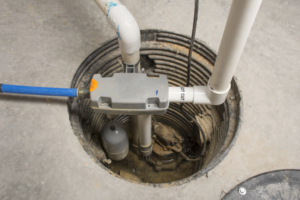Preventing Water in Basements

In Oklahoma City, the biggest concern for homeowners related to their basement and/or crawlspace area is unwanted moisture intrusion. This can be the result of several factors, which is why homeowners should occasionally check these areas. Preventing water in basements should be job #1 for the home owner.
The basement is typically the area of a home most at risk for water damage because it’s located below grade and surrounded by soil. Soil releases the water it has absorbed during rain or when snow melts, and the water can end up in the basement through cracks. Water can even migrate through solid concrete walls via capillary action, which is a phenomenon whereby liquid spontaneously rises in a narrow space, such as a thin tube, or via porous materials. Wet basements can cause problems that include peeling paint, toxic mold contamination, building rot, foundation collapse, and termite damage. Even interior air quality can be affected if naturally occurring gases released by the soil are being transmitted into the basement.
Properly waterproofing a basement will lessen the risk of damage caused by moisture or water. Homeowners should be aware of what they can do to keep their basements and crawlspaces dry and safe from damage.
Prevent water entry.
You can help prevent water from entering the basement by ensuring that it’s diverted away from the foundation. Poor roof drainage and surface runoff due to gutter defects and improper site grading may be the most common causes of a wet basement.
Here are some measures to use to divert water away from the foundation:
- Install and maintain gutters and downspouts so that they route all rainwater and snow melt at least 10 feet away from the foundation to prevent pooling near the exterior walls. At the point where water leaves the downspout, it should be able to flow freely away from the foundation instead of back toward it, and it should not be collecting in standing puddles. A backsplash and diverter can help with this.
- The finish grade should be sloped away from the building for 10 to 15 feet. Low spots that may lead to water pooling near the foundation should be re-graded and evened out.
- Shallow ditches called swales should be dug if one or more sides of the home face an upward slope. A swale should slope away from the home for 10 to 15 feet, at which point it can empty into another swale that directs water around to the downhill-side of the property, leading it away from the foundation.
Repair all cracks and holes.
There are several causes of cracks and holes that permit moisture intrusion. Poor workmanship during the home’s construction is one factor. Water pressure from the outside can also build up, forcing water through the walls. The house may have settled, causing cracks in the floor or walls. As home inspectors we see this all the time. It’s important to repair all cracks and small holes to prevent leaks and floods. Any large cracks or holes should be evaluated by a professional after consulting with your InterNACHI home inspector.
Here are some steps to take if you suspect that water is entering the basement through cracks or holes:
- Examine the basement for holes and cracks and for moisture, leaks and discoloration.
- A waterproof mixture of epoxy and latex cement can be used to fill small hairline cracks and holes.
- Any cracks larger than about 1/8-inch should be filled with mortar made from one part cement and two parts fine sand, with just enough water to make a fairly stiff mortar. It should be pressed firmly into all parts of the larger cracks and holes to be sure that no air bubbles or pockets remain. As long as water is not being forced through the basement walls due to outside pressure, the application of mortar with a standard trowel will be sufficient if special care is taken to fill all cracks completely.
- If water is being forced through by outside pressure, a slightly different method of patching can be used, involving chiseling out the mouth the crack along its length and cutting a dovetail groove, which is then filled with mortar. You may wish to defer this type of repair to a masonry professional.
- Sodium silicate is a water-based mixture that will actually penetrate the substrate by up to 4 inches. Concrete, concrete block and masonry include lime as a natural component, which reacts with the sodium silicate to produce a solid, crystalline structure that fills in all the microscopic cracks, holes and pores. No water vapor or gas will be able penetrate via capillary action because the concrete and masonry have now become harder and denser from the sodium silicate. It is an alkaline substance and, as such, can burn the skin and eyes on contact. Inhalation can also cause respiratory irritation. All surfaces receiving this treatment must be prepared, and the several required applications must be thorough. These are all reasons that this type of work should be performed by a trained professional.
Always have any large cracks evaluated by your InterNACHI inspector before undertaking any repairs yourself or hiring a professional, and check your basement and crawlspace regularly for moisture intrusion. Adding a De-Humidifier and or a Sump Pump can really be beneficial as well.
Home Run Inspections, LLC
Oklahoma: 405-905-9175
We Cover All the Bases!
Serving: Oklahoma City, Edmond, Yukon, Piedmont, Bethany, El Reno, Tuttle, Mustang, Moore, Norman, Midwest City, Del City, Choctaw, McCloud, Shawnee, Harrah, Newalla, Jones, and more.
Schedule Your Inspections Online at:
Like us on FaceBook
Follow us on Twitter
Follow us on Instagram
#basement #basements #crawlspace #moisture #homeruninspections #homeinspectors #homeinspectorokc #homeinspectornearme #inspectionservices #realestateagent #realestateinvestment #OKCRealEstate


